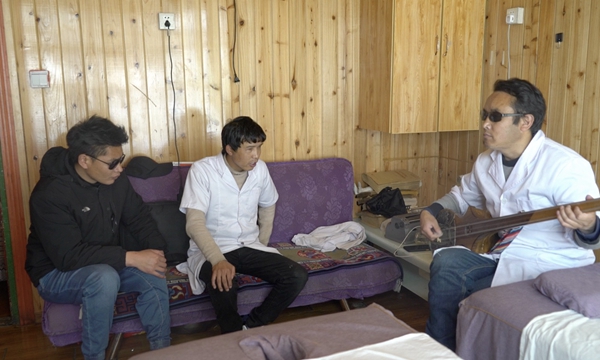Student seeks to alter public view of blind people in Tibet
By Wang Ru | China Daily | Updated: 2020-04-30 08:15

Tsering Choekyi originally wanted to center on Tsering Dhondup and his colleagues' band, but due to the pandemic, some of the band members are staying at home, and they cannot give performances now, so she adjusted her focus on the massage business.
In the beginning, Tsering Dhondup and his colleagues were not very accustomed to the camera and asked Tsering Choekyi if they should say something or wear uniforms when working, but they soon acclimatized to it and began behaving naturally.
Tsering Choekyi was impressed by Tashi, a 22-year-old who was born blind. He is, surprisingly, still a high school student and works in the massage shop in his spare time. Over the years Tashi's eyesight has improved and he can see some colors. Tsering Choekyi asks about his impression of the world, and he replies "blue sky and white clouds".
"We can see blue sky and white clouds often, and regard them as normal, but for Tashi, they are how he views the whole world," says Tsering Choekyi.
She also discovered that the lives of the blind are not as different from those of sighted people as she imagined.
"I used to imagine their life would be very inconvenient, and I was afraid that talking with them about their blindness may hurt their feelings. However, everything is OK, they are not so sensitive. They live just like ordinary people, and their positiveness touched me a lot."
During filming, Tsering Choekyi discovered that, since many parents of the disabled in Tibet are poorly educated, they don't tend to encourage their children to attend school or find work outside their community.
"For example, Tashi is of similar age to me, but I'm going to graduate from university, while he is still attending high school, because he didn't start attending school until he was 14. Before that, he just stayed at home doing chores like feeding the livestock. Even after he learned braille at school, his parents didn't understand the need to learn it."
The masseurs all consider themselves lucky, since they don't live at home and can support themselves through their own efforts.
Tsering Choekyi says the final documentary will be submitted in June for graduation. Already enrolled as a postgraduate at Tsinghua University, she will continue to pursue her master's degree in journalism.
She has made short documentaries about an animal photographer, a carving craftsman and an old Japanese woman who runs a restaurant in China. It is her first time shooting a long-format documentary about people in Tibet.
"Many people say documentaries only show problems, but don't provide a solution, and that, sometimes, they simply exploit the disadvantaged. I don't want to do that," says Tsering Choekyi.
"I hope I can understand them, and that they can understand me as well. I hope I can give something to them through this documentary. Even if the work is not that influential, it will make them understand that, to me, they are unique."
























